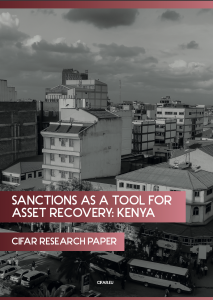Sanctions As a Tool For Asset Recovery: Kenya
This report is part of a series of national studies assessing the impact of international sanctions. Read other reports here: Mexico, Moldova, Mozambique
This research study assesses the current state of play in the use of sanctions as an asset recovery tool, examining their application in Kenya, and their prospects for addressing grand corruption.
To date, the effectiveness, drawbacks, and limitations of using sanctions as an anti-corruption at the global and regional levels to respond to cases of suspected grand, cross-border corruption has not been assessed. In part, this is because the use of sanctions for cases of corruption is rather new and is usually tied to human rights abuses or cases of political instability.
However, because of this and the political nature of sanctions and their growing usage as one of the anti-corruption tools, there is room to consider whether this approach is the most effective to take or whether other mechanisms, such as those based on legal processes, could be more effective and more rules-based in fighting this form of corruption.
Key messages
- Kenya has been relatively successful in recent years in concluding modest asset recovery agreements and has shifted its strategy from purely pursuing corruption prosecutions and convictions to also tracing and locating the proceeds of corruption.
- The UK, the EU, and the US have sanctioned several Kenyan nationals and residents of Kenya on the grounds of support for terrorism and corrupt conduct.
- Sanctions imposed by other countries have though been portrayed within Kenya as politically motivated and designed to preserve geopolitical or business advantage.
- The use of Magnitsky-style, ‘smart’ sanctions may present some advantages and opportunities in Kenya, especially in tackling past cases.
- Care needs to be taken when imposing these international sanctions that they address primarily cases where national progress is stalled. Extensive communication with a wide range of Kenyan stakeholders during the process is recommended.
Any further enquiries into the report or request for comment or quote can be directed to Lucia Cizmaziova, lcizmaziova@cifar.eu.

